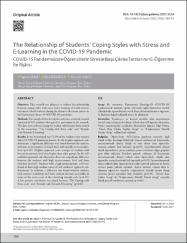| dc.contributor.author | Akbal, Yağmur | |
| dc.contributor.author | Pekmezci Purut, Hilal | |
| dc.contributor.author | Çuvalcı, Burcu | |
| dc.date.accessioned | 2022-10-19T13:41:17Z | |
| dc.date.available | 2022-10-19T13:41:17Z | |
| dc.date.issued | 2022 | en_US |
| dc.identifier.citation | Akbal, Y., Pekmezci Purut, H. & Çuvalcı, B. (2022). The Relationship of Students' Coping Styles with Stress and E-Learning in the COVID-19 Pandemic. Bezmialem Science, 10(2), 184-193. http://doi.org/10.14235/bas.galenos.2021.5534 | en_US |
| dc.identifier.issn | 2148-2373 | |
| dc.identifier.uri | http://doi.org/10.14235/bas.galenos.2021.5534 | |
| dc.identifier.uri | https://hdl.handle.net/11436/6795 | |
| dc.description.abstract | Objective: This research was planned to evaluate the relationship between coping styles with stress and e-learning of health services vocational school students during the distance education process in the Coronavirus diease-19 (COVID-19) pandemic.
Methods: The sample of this descriptive and cross-sectional research consisted of 425 students who agreed to participate in the research. The data were collected using the student information form created by the researchers, "The Coping with Stress scale" and "Attitude scale Towards E-learning".
Results: It was determined that 72.2% of the students were worried about COVID-19 pandemic process. In the helpless approach sub-dimension, a significant difference was found between the students with low socioeconomic level and those with middle socioeconomic level (p<0.05). Helpless approach score averages of students with low socioeconomic level were higher than other groups. In the self-confident approach sub-dimension, there was a significant difference between the students with high socioeconomic level and those with low (p<0.05). Students with a high socioeconomic level were found to have high median scores of self-confident approach sub-dimension. In addition, a difference was found between students with internet availability and those without into net availability in terms of the mean score of the e-learning attitude scale (p<0.05). A low positive correlation was found between "The Coping with Stress scale" and "Attitude scale Towards E-learning" (p<0.001).
Conclusion: There is a positive relationship between the ways of coping with stress and the attitude towards e-learning in healthcare students during the pandemic process. | en_US |
| dc.language.iso | eng | en_US |
| dc.publisher | Bezmialem Vakıf Üniversitesi | en_US |
| dc.rights | info:eu-repo/semantics/openAccess | en_US |
| dc.subject | COVID-19 | en_US |
| dc.subject | E-learning | en_US |
| dc.subject | Students | en_US |
| dc.subject | Healthy | en_US |
| dc.subject | Stress | en_US |
| dc.title | The relationship of students' coping styles with stress and e-learning in the COVID-19 pandemic | en_US |
| dc.type | article | en_US |
| dc.contributor.department | RTEÜ, Sağlık Yüksekokulu, Hemşirelik Bölümü | en_US |
| dc.contributor.institutionauthor | Akbal, Yağmur | |
| dc.contributor.institutionauthor | Pekmezci Purut, Hilal | |
| dc.contributor.institutionauthor | Çuvalcı, Burcu | |
| dc.identifier.doi | 10.14235/bas.galenos.2021.5534 | en_US |
| dc.identifier.volume | 10 | en_US |
| dc.identifier.issue | 2 | en_US |
| dc.identifier.startpage | 184 | en_US |
| dc.identifier.endpage | 193 | en_US |
| dc.relation.journal | Bezmialem Science | en_US |
| dc.relation.publicationcategory | Makale - Uluslararası Hakemli Dergi - Kurum Öğretim Elemanı | en_US |


















